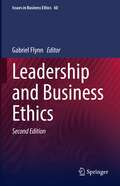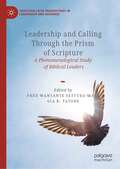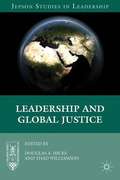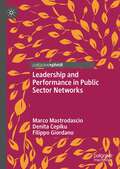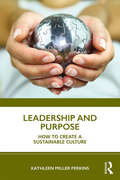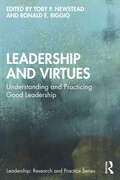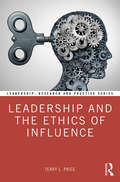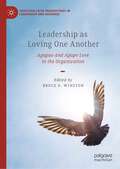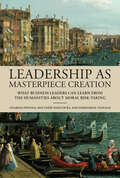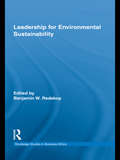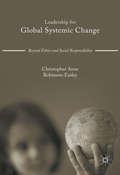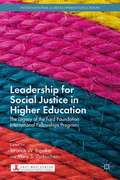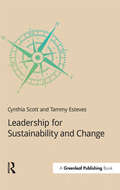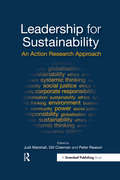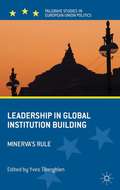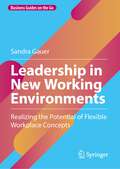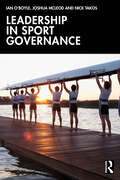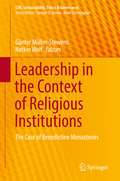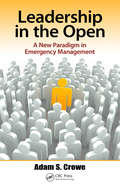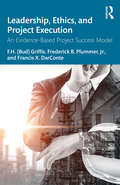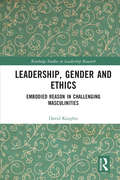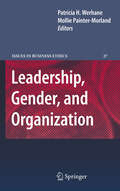- Table View
- List View
Leadership and Business Ethics (Issues in Business Ethics #60)
by Gabriel FlynnThis book offers new and challenging approaches to business ethics that successfully link theory and practice thereby overcoming lacunae and inadequacies in much of the literature concerning ethics and governance, a theme that recurs with remarkable frequency in the history of business ethics as an academic discipline. This work provides imaginative and innovate proposals for the indispensable coupling of virtue, integrity, and character with global business, finance, and banking. The volume seeks to overcome the marginal status of business ethics in universities, business, and enterprise by demonstrating that virtue ethics is an important step in the direction of an adequate response to the leadership issue. This new edition of a popular work points to new ways of achieving an ever more urgent coalescence of ethics and business. It proposes practical advice and viable suggestions to business people on what is right and wrong in business. The volume makes a vital contribution in the area of education that should serve the ongoing development of top leaders. In the important domain of women in leadership, the volume provides new solutions that break boundaries on the global stage. The work challenges unethical marketing of human images with important implications for citizenship and society. The volume contains creative suggestions for the use of spirituality and human development for the enhancement of business and society. The significantly extended second edition includes an exciting line up of leading academics and practitioners in the audacious hope that something may change for the better in the realms of business and banking.
Leadership and Calling Through the Prism of Scripture: A Phenomenological Study of Biblical Leaders (Christian Faith Perspectives in Leadership and Business)
by Fred Wantante Settuba-Male Gia R. TatoneThis volume offers phenomenological studies that examine the lived experiences of biblical leaders, emphasizing external summons and a prosocial intention while offering suggestions for future research. Part 1 focuses on various aspects of divine calling and leadership, covering topics such as the calling of biblical prophets like Jeremiah and Samuel, and the downfall of Solomon. Part 2 explores successful biblical leadership and followership from a qualitative, phenomenological lens, analyzing the experiences of Abraham, Paul, and Samson. Part 3 presents both positive and negative portrayals of biblical leadership, demonstrating how both types can lead to social justice outcomes.Presenting a Christian perspective of the relationship between the leaders and their sense of calling, this book employs a phenomenological approach to investigate the significance of various aspects of God’s calling, such as the leader’s discernment of the calling, predictors of a leader’s calling, the social- cultural influences of the calling, the relationship between personality traits and calling, and the evolution of a leader’s calling. This book will contribute to scholarly discussions related to meaningful work, workplace satisfaction, employee engagement, and responsible leadership.
Leadership and Global Justice
by Douglas A. Hicks Thad WilliamsonWhat does global justice look like, and how can leadership help get us there? The contributors explore justice in various spheres: citizenship, the marketplace, health, education, and the environment. And they provide creative and constructive moral approaches for evaluating and promoting global justice.
Leadership and Performance in Public Sector Networks
by Denita Cepiku Marco Mastrodascio Filippo GiordanoThis book analyses two key aspects of network management in the public sector: leadership and performance. It investigates what integrative leadership is, and how it differentiates from leadership in single-agency structures. It also examines the performance of public interest networks by proposing an analytical framework that highlights which factors lead to high performance networks. This book is of interest to scholars and students of public management and public administration, as well as public managers and practitioners acting through networks and partnerships.
Leadership and Purpose: How to Create a Sustainable Culture
by Kathleen Miller PerkinsCompanies that have integrated a contribution to society into their business models are more likely than others to succeed for the long term. This book provides you with information, tips, and tools to assess and strengthen your company for ongoing success. Through the use of case studies, the book describes the leaders’ journeys – the mistakes they made, the successes they achieved, and the lessons they learned. Some are certified as Benefits Corporations (B Corps) because they have incorporated a clear societal purpose into their missions and they are able to demonstrate positive social impact. Others, while not certified B Corps, are at various stages in their commitments to society. The book is for leaders at many levels, including CEOs, senior leaders, and managers, as well as those without formal positions of authority but who can influence others and contribute to a sustainable culture.
Leadership and Virtues: Understanding and Practicing Good Leadership (Leadership: Research and Practice)
by Ronald E. RiggioGood leadership is something every leader and organization should strive towards. This book serves as a pivotal resource in encouraging the understanding and practice of leadership and highlights how good leadership is anchored in the rich philosophy and science of virtue. Through a diverse range of perspectives, the book highlights the importance of leading with virtue, unpacks what it means to be a virtuous leader, and outlines practical strategies for developing and practicing good leadership. Taking a virtues perspective, this cohesive collection of chapters by scholars from around the globe offers an inclusive tone and speaks to practicing and aspiring leaders worldwide. Readers are provided with a nuanced account of the nature of virtues and leadership and how the two interact on multiple levels and in multiple ways to inform the practice of good leadership. Focusing on the tradition of virtue gives this collection a robust scholarly foundation, while simultaneously providing scope for diverse views on how and why virtues inform good leadership. The book offers a balance of scholarly and practice-oriented chapters, instilling readers with a deep understanding of virtues and leadership, and practical strategies to develop their practice of good and virtuous leadership. Each chapter offers a different moral and sociological insight, serving altogether to show readers the most effective ways to use virtues to promote shared well-being and collective success. Scholars, students of leadership and management, and leadership practitioners will benefit from the accessible and practical lessons this book has to offer. This volume will also be of interest to team leaders and managers who are keen to develop their leadership skills in both practice and theory.
Leadership and the Ethics of Influence (Leadership: Research and Practice)
by Terry L. PriceHow do leaders influence others? Although they sometimes appeal directly to good reasons, which we associate with rational persuasion, leaders also use guilt, pressure, flattery, bullying, and rewards and punishment—all to get the behaviors that they want. Even when leaders refrain from outright lying, they are nevertheless known to practice something approaching, perhaps reaching, the level of manipulation. Influence therefore presents a serious ethical problem across leadership contexts. Leadership and the Ethics of Influence argues that influence puts leaders at risk of using people. It is generally disrespectful of autonomy to figure out what makes people "tick" in an effort to "handle" them. In contrast with physical force, influence works through agency, not around it. Despite this feature of influence—and, to a large extent because of it—the everyday influence associated with leadership is often morally troublesome. What matters morally is not only whether agency is bypassed or overridden but also who is ultimately in control. This book uses philosophy and leadership studies to show how leaders across different contexts can be justified in getting followers to do things. Connecting moral theory to leadership theory, and especially to charismatic leadership, authentic leadership, transforming leadership, and ethical leadership, this book is essential reading for leadership scholars, students, and practitioners.
Leadership as Loving One Another: Agapao and Agape Love in the Organization (Christian Faith Perspectives in Leadership and Business)
by Bruce E. WinstonThis volume explores leadership as a form of loving one’s employees, centering on the biblical concepts of Agapao and Agape. It is organized into three parts: Part 1 examines biblical principles about Agapao and Agape; Part 2 employs Positive Organizational Scholarship (POS) to identify the role of love in organizational contexts; Part 3 offers case studies illustrating instances of love demonstrated by biblical figures in organizational and familial settings.Aligned with POS research, the book accentuates positive, life-giving, and conditions fostering human flourishing within organizations. This scholarly endeavor contributes to advancing research in areas such as work relationships, workplace spirituality, meaningful work, and the role of leadership in improving organizational performance.
Leadership as Masterpiece Creation: What Business Leaders Can Learn from the Humanities about Moral Risk-Taking
by Charles Spinosa Haridimos Tsoukas Matthew HancocksHow leaders can take the moral risks necessary to create &“masterpieces&”—admirable, distinctive, and high-achieving businesses that create meaningful lives for customers, employees, and themselves.In Leadership as Masterpiece Creation, Charles Spinosa, Matthew Hancocks, and Haridimos Tsoukas show how the humanities can help leaders create profitable, masterpiece organizations. Such organizations, they assert, are ones that possess the emotional and moral sensibilities of an artist, the wisdom of a statesperson, and the technical know-how of commerce. The authors draw on the works of Nietzsche, Heidegger, Bernard Williams, Shakespeare, and Machiavelli to conceptualize moral risk-taking, and then on the actions of Churchill, Madam C. J. Walker, Anita Roddick, Jeff Bezos, and others to show how the humanities can help create admirable businesses today.As management consultants and educators steeped in the humanities themselves, the authors discuss their experiences helping business leaders achieve successful masterpieces that bring good lives to many. After describing our contemporary business environment and examples of leaders who have created masterpiece organizations, the book turns to the basic skills of masterpiece creation: managing moods, building trust, listening for difference, and speaking truth to power. Then come the senior skills: moral risk-taking and creating a masterpiece organizational culture, strategy, and leadership style. Last, the authors explain why their leaders build an economy of gratitude.A culturally ambitious and refreshing read, Leadership as Masterpiece Creation is an invaluable volume for leaders of every stripe who wish to act daily with moral imagination.
Leadership for Environmental Sustainability (Routledge Studies in Business Ethics)
by Benjamin W. RedekopAs the first book in the field of leadership studies to approach sustainability as a multi-faceted leadership challenge, Leadership for Environmental Sustainability will help to set the terms of the discussion on this topic among students, scholars, and practitioners of leadership for years to come. It explores the connection between leadership and sustainability from a variety of disciplinary perspectives, including sociology, history, psychology, business, literature, communication, and the arts. With short chapters edited for readability, the book is aimed at scholars, practitioners, students, and educated lay readers interested in cutting-edge research and thinking on this topic.
Leadership for Global Systemic Change
by Christopher Anne Robinson-easleyThis book argues that organizations, corporations, and governments have the abilities and resources to drive deep systemic change, yet fail to evoke change strategies that can significantly improve the social fabric of our global environment. It actively engages the reader in a conversation that reviews, evaluates, and challenges these issues juxtaposed to current strategies and resulting positions regarding business ethics, social responsibility, our view towards humanity, and the role of leaders. Provocative in its voice and message, this book demonstrates how more robust contributions can lead to effective change. The author includes a detailed change model designed to invoke significant global change that builds upon the current work of the United Nations' Global Compact, and incorporates the participation of all critical stakeholders including corporate leaders, civil society, government leaders, and the people who are challenged daily by ethical dilemmas and social responsibility initiatives. It speaks to academics and students of change management, social responsibility, and business ethics, as well as the organizations and communities who stand to make a positive difference in the world.
Leadership for Global Systemic Change: Beyond Ethics and Social Responsibility
by Christopher Anne Robinson-EasleyThis book argues that organizations, corporations, and governments have the abilities and resources to drive deep systemic change, yet fail to evoke change strategies that can significantly improve the social fabric of our global environment. It actively engages the reader in a conversation that reviews, evaluates, and challenges these issues juxtaposed to current strategies and resulting positions regarding business ethics, social responsibility, our view towards humanity, and the role of leaders.Provocative in its voice and message, this book demonstrates how more robust contributions can lead to effective change. The author includes a detailed change model designed to invoke significant global change that builds upon the current work of the United Nations’ Global Compact, and incorporates the participation of all critical stakeholders including corporate leaders, civil society, government leaders, and the people who are challenged daily by ethical dilemmas and social responsibility initiatives. It speaks to academics and students of change management, social responsibility, and business ethics, as well as the organizations and communities who stand to make a positive difference in the world.
Leadership for Social Justice in Higher Education
by Terance W. Bigalke Mary S. ZurbuchenThis book provides a wealth of comparative information on social justice in higher education worldwide by examining how the Ford Foundation International Fellowships Program, the world's largest private fellowship program in higher education, has succeeded in fostering social justice leadership over the past ten years.
Leadership for Sustainability and Change (Doshorts Ser.)
by Cynthia Scott Tammy EstevesWe live in challenging times. New leaders are enhancing their "inner game" to maximize their organizational impact, and using the principles of sustainability to help their organizations thrive and innovate in response to 21st century challenges. Leadership for Sustainability and Change is a concise, practical and energizing distillation of what is working for today's most successful sustainability leaders. It provides a clear set of actions you can take to generate transformation, with results yielding market advantage, eco-efficiency, product or service innovation, personal resilience and engaged communities. Learn from the experience of successful sustainability leaders how to: build personal resilience and agility to lead change for the long-run; sustain innovation that is released in bursts of focused "energy for good"; draw attention to what is working by focusing on the power of small differences; decrease resistance and increase motivation with a change acceleration model; identify stages of individual and organizational readiness for change; use rapid prototyping to increase group engagement; tell compelling stories to encourage teams to initiate action. Leadership for Sustainability and Change offers guidance for leaders who are shaping the future of sustainability within their organizations. The book includes a simple framework for assessing your progress, so that you can revisit the tools and processes you need most.
Leadership for Sustainability: An Action Research Approach
by Peter Reason Judi Marshall Gill ColemanThose who advocate moving towards sustainability debate how change can be achieved. This book focuses on what it means to take up leadership for sustainability, from a variety of organizational and social positions, and considers the consequences of different strategies and practices for influencing change.
Leadership in Global Institution Building
by Yves TiberghienBetween 1995 and the present day, the world has undergone significant advances in international law, norms, and institutions. Progress was particularly intense in the fields of global environment, human security, cultural diversity, and human rights. This book reveals the key role played by the European Union, Japan, and Canada in this process.
Leadership in New Working Environments: Realizing the Potential of Flexible Workplace Concepts (Business Guides on the Go)
by Sandra GauerThis book discusses the challenges that modern and flexible workplace concepts pose for managers. In particular, it addresses the uncertainties and stress factors that employees face when working in multi-space environments and how they become attached to their workplace. Drawing on a hybrid methodological approach that combines a literature review with practical lessons learned as a workplace change consultant, it offers managers concrete advice on how to lead in multi-space environments. This book aims to reduce the uncertainties and stressors caused by new work environments, and ideally to transform them into growth opportunities for the entire company. Providing concrete solutions, it represents a valuable asset for managers, HR professionals, and workplace initiative leaders alike.
Leadership in Sport Governance
by Ian O'Boyle Joshua McLeod Nick TakosThis is a concise introduction to leadership and governance theory and how they are applied in sport. Presenting a series of case studies from around the world, the book offers a detailed guide to best practice in the leadership of sport boards and organisations. Drawing on cutting-edge research, the book sets out the core concepts and principles of good leadership and good governance, explaining their importance in an era in which sport organisations have become increasingly bound by legal frameworks and subject to greater calls for accountability from wider society. The book analyses the key issues related to leadership in sport governance, including leadership styles with a focus on authentic leadership; intra-group dynamics; managing conflict and trust; leading in multi-layered networks; strategic leadership; and diversity, equity, and inclusion (DEI); and it considers the differing requirements of sport leadership in different geographical locations, under varying challenges and pressures. Full of illuminating cases, data and examples, this is an invaluable reading for any course in sport business and management and a useful primer for any sport business professional looking to improve their professional knowledge.
Leadership in the Context of Religious Institutions: The Case of Benedictine Monasteries (CSR, Sustainability, Ethics & Governance)
by Günter Müller-Stewens Notker WolfThis book explores opportunities and limitations with regard to transferring knowledge and tools from the corporate world to manage monasteries or other types of religious institutions. To do so, the contributing authors analyze both the ideological and practical implications of employing modern organizational theory in the context of religious institutions, and seek to strike a balance between preserving traditions and promoting modernization. In this regard, they draw on experience gained in the course of long-standing collaborations between religious institutions, such as monasteries, and business and management schools.
Leadership in the Open: A New Paradigm in Emergency Management
by Adam CroweAs a relatively young field, emergency management has already undergone considerable evolution and change. And now that Web 2.0 technologies and social media sites such as Facebook and Twitter have become inherently ingrained in all facets of our lives, emergency managers must once again re-evaluate best practices and standardized approaches.Provid
Leadership in the Pharmaceutical Industry: From Theory to Practice (Routledge Focus on Business and Management)
by Nataliia AliekperovaLeadership in the Pharmaceutical Industry focuses on leadership in pharmaceutical organisations at three levels: individual, team, and organisational. At the individual level, it covers leadership basics, theories, types of leaders, differences between leaders and managers, leadership traits and skills, and systems thinking. At the team level, it explores leadership styles, the leader’s interaction with the team, and employee motivation, including the use of intrinsic motivational factors. At the organisational level, it examines the leader’s role in creating and maintaining organisational culture, forming and implementing organisational strategy, and managing organisational changes.The book also addresses the specifics of the pharmaceutical industry, including the types and characteristics of innovations and the ethics of leader behaviour, emphasising the importance of ethical leadership. Notably, leadership issues are illustrated with practical cases featuring prominent leaders such as Paul Janssen, Daniel Vasella, Charles Walgreen III, John C. Martin, Roy Vagelos, Albert Bourla, Kiran Mazumdar-Shaw, and Filya Zhebrovska. These leaders were or are involved in creating, manufacturing, and providing patients with pharmaceutical products.The book is designed to benefit readers from various business sectors, with the primary audience being academics, students, and individuals interested in leadership in the pharmaceutical industry.
Leadership is Dead
by Jeremie KubicekAnyone can make an impact. All you need is influence--the most potent professional asset on the planet. The problem is that influence is also the most underused asset on the planet. And the primary reason is that the enemy of influence is a universal human trait: self-preservation. You guard your ideas, your status, and your reputation. Within your self-constructed walls you must cast safer visions, take smaller risks, and accept shallower relationships to ensure the security of all you are protecting. This is the downside of self-preservation: While your walls protect you and yours from demise, they also restrict your influence. You must break down your walls of self-preservation and sacrifice your security for the sake of others. Only then does the escalating paradox of personal generosity come into play: The more you give, the more you receive. This book shows that the key to effective leadership is learning how to influence in a way that engenders greater trust, stronger partnerships, and more impactful endeavors.
Leadership, Ethics, and Project Execution: An Evidence-Based Project Success Model
by F.H. (Bud) Griffis Frederick B. Plummer Francis X. DarConteLeadership, Ethics, and Project Execution provides a masterclass in the project and people management skills that set apart the most accomplished design and construction professionals. This textbook for graduate and advanced undergraduate students distils the insights gleaned over the authors’ decades of experience in academia and industry into actionable principles for success in a notoriously demanding field. Combining real life case studies with original research, Leadership, Ethics, and Project Execution points the way from the classroom to the jobsite. Interactive exercises allow readers to take the role of junior project managers and other emerging professionals and reason through the ethical dilemmas surrounding building projects from the initial bid to completion. Chapters on stakeholder alignment, productivity, and project success ensure that aspiring leaders’ business decisions are as economically sound as they are ethically correct. From its accessible, conversational tone to the lifetime’s worth of construction wisdom it shares, Leadership, Ethics, and Project Execution offers an extended mentoring session with three giants of the building industry.
Leadership, Gender and Ethics: Embodied Reason in Challenging Masculinities (Routledge Studies in Leadership Research)
by David KnightsThis book has a clear concern to offer a distinctive way of studying leadership so that it might be practiced differently. It is distinctive in focusing on contemporary concerns about gender and ethics. More precisely, it examines the masculinity of leadership and how, through an embodied form of reasoning, it might be challenged or disrupted. A central argument of the book is that masculine leadership elevates rationality in ways that marginalize the body and feelings and often has the effect of sanctioning unethical behavior. In exploring this thesis, Leadership, Gender and Ethics: Embodied Reason in Challenging Masculinities provides an analysis of the comparatively neglected issues of identity/anxiety, power/resistance, diversity/gender, and the body/masculinities surrounding the concept and practice of leadership. It also illustrates the arguments of the book by examining leadership through an empirical examination of academic life, organization change and innovation, and the global financial crisis of 2008. In a postscript, it analyses some examples of masculine leadership in the global pandemic of 2020. This book will be of interest generally to researchers, academics and students in the field of leadership and management and will be of special interest to those who seek to understand the intersections between leadership and gender, ethics and embodied approaches. It will also appeal to those who seek to develop new ways of thinking and theorizing about leadership in terms of identities and insecurities, power and masculinity, ethics and the body. Its insights might not only change studies but also practices of leadership.
Leadership, Gender, and Organization
by Mollie Painter-Morland Patricia WerhaneThis text provides perspectives on the way in which gender plays a role in leadership dynamics and ethics within organizations. It seeks to offer new theoretical models for thinking about leadership and organizational influence. Most studies of women's leadership draw on an ethics of care as characteristic of the way women lead, but as such, it tends towards essentialist gender stereotypes and does little to explain the complex systemic variables that influence the functioning of women within organizations. This book moves beyond the canon in exploring alternative paradigms for thinking about leadership and gender in organizations. The authors draw on the literature available in systems thinking, systemic leadership, and gender theory to offer alternative perspectives for thinking about the ways women lead. The book offers invaluable theoretical perspectives and insightful narratives to graduate students and researchers who are interested in women's leadership, gender and organization. It will be of interest to all women in leadership positions, but specifically to those interested in understanding the systemic nature of leadership and their role within it.
